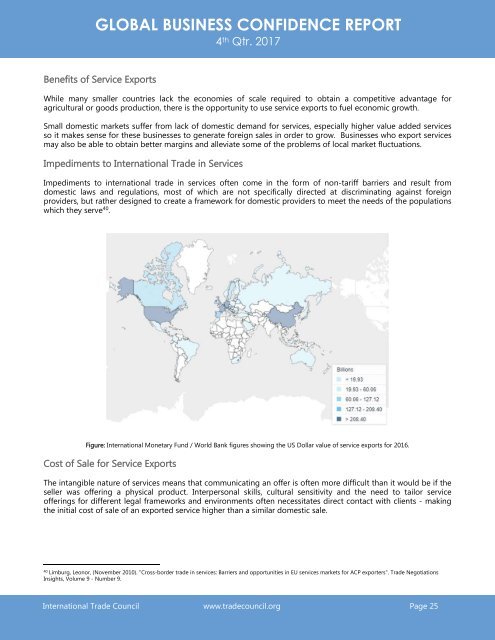2017 4th Quarter International Trade Council Global Business Confidence Survey
The Global Business Confidence Survey is designed to take the pulse of companies and sectors and reports on the conditions for businesses like yours. It offers valuable insights into trends of US and global business confidence by surveying people from across a broad spectrum of industries. The survey draws information from a range of sectors about current and historical business growth trends, efficiency, employment, regulation and other conditions affecting industry. Key users of statistical data include government agencies, trade bodies, chambers of commerce and academic researchers. This survey report was produced by the International Trade Council (http://www.tradecouncil.org | http://www.itcapproved.org).
The Global Business Confidence Survey is designed to take the pulse of companies and sectors and reports on the conditions for businesses like yours. It offers valuable insights into trends of US and global business confidence by surveying people from across a broad spectrum of industries. The survey draws information from a range of sectors about current and historical business growth trends, efficiency, employment, regulation and other conditions affecting industry.
Key users of statistical data include government agencies, trade bodies, chambers of commerce and academic researchers. This survey report was produced by the International Trade Council (http://www.tradecouncil.org | http://www.itcapproved.org).
Create successful ePaper yourself
Turn your PDF publications into a flip-book with our unique Google optimized e-Paper software.
GLOBAL BUSINESS CONFIDENCE REPORT<br />
4 th Qtr. <strong>2017</strong><br />
Benefits of Service Exports<br />
While many smaller countries lack the economies of scale required to obtain a competitive advantage for<br />
agricultural or goods production, there is the opportunity to use service exports to fuel economic growth.<br />
Small domestic markets suffer from lack of domestic demand for services, especially higher value added services<br />
so it makes sense for these businesses to generate foreign sales in order to grow. <strong>Business</strong>es who export services<br />
may also be able to obtain better margins and alleviate some of the problems of local market fluctuations.<br />
Impediments to <strong>International</strong> <strong>Trade</strong> in Services<br />
Impediments to international trade in services often come in the form of non-tariff barriers and result from<br />
domestic laws and regulations, most of which are not specifically directed at discriminating against foreign<br />
providers, but rather designed to create a framework for domestic providers to meet the needs of the populations<br />
which they serve 40 .<br />
Figure: <strong>International</strong> Monetary Fund / World Bank figures showing the US Dollar value of service exports for 2016.<br />
Cost of Sale for Service Exports<br />
The intangible nature of services means that communicating an offer is often more difficult than it would be if the<br />
seller was offering a physical product. Interpersonal skills, cultural sensitivity and the need to tailor service<br />
offerings for different legal frameworks and environments often necessitates direct contact with clients - making<br />
the initial cost of sale of an exported service higher than a similar domestic sale.<br />
40<br />
Limburg, Leonor, (November 2010). "Cross-border trade in services: Barriers and opportunities in EU services markets for ACP exporters". <strong>Trade</strong> Negotiations<br />
Insights, Volume 9 - Number 9.<br />
<strong>International</strong> <strong>Trade</strong> <strong>Council</strong> www.tradecouncil.org Page 25


